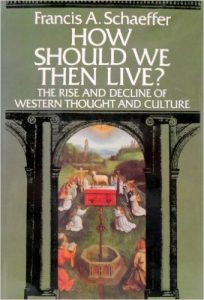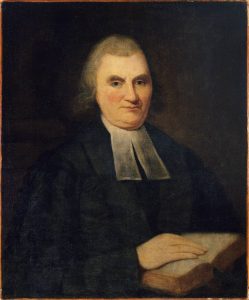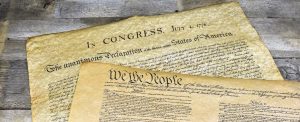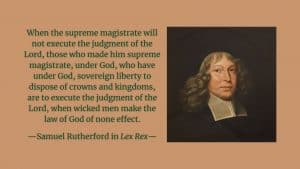[In 1644,] Samuel Rutherford penned his classic work Lex Rex , arguing that the written law stands above the king, and when the king strays, his actions are unjust and may be resisted, indeed must be resisted. Rutherford was the inspiration for the twentieth-century theologian Francis Schaeffer, who claimed in his Christian Manifesto that “at a certain point there is not only the right, but the duty, to disobey the state.”
—Charles Colson—
Key points: Only God has absolute authority. Government does not; its authority is divinely delegated and divinely limited. Scripture affirms this. To preserve liberty, those in a nation who understand this principle must resist governmental attempts to rule arbitrarily. According to the Founding Fathers of America, “it is” the people’s “right, it is their duty” to do so. This, too, aligns with biblical teaching.
Many, many decades before the firing of “the shot heard ’round the world” and the start of the American Revolution, seeds were planted that eventually gave rise to the establishment of a nation based on principles of self-government, the ideal of God-given equality among all persons, and a belief in divinely bestowed unalienable rights.

In fact, the Protestant Reformation helped bring such a nation into existence, even though it occurred more than two centuries before America’s founding. In this post and the next I’d like to explore several ideas promoted by two men who lived and died several decades before the founding of the United States, but whose influence in establishing America nevertheless was powerful and profound.
-
- Samuel Rutherford was a Scottish, Presbyterian clergyman who lived from 1600 to 1661. We see the influence of the Reformation particularly when we examine Rutherford’s writings.
- John Locke was a philosopher from England who lived from 1632 to 1704. His work dealt with politics, government, epistemology, and religious liberty. Locke “also made contributions in the fields of theology, education, and economics.” While Locke is considered an Enlightenment thinker, his work and insights nevertheless have biblical theological underpinnings.
We’ll consider Samuel Rutherford’s contribution in this first article. Rutherford was a deeply committed Christian who frequently expressed his love for Christ, even though he knew great hardship. Here and here are two short articles about Rutherford’s life and ministry. The following video is a 2-minute tribute to Rutherford, on location in Scotland.
During Rutherford’s day, nations were ruled by kings, and a king’s word was the final authority. In other words, kings and queens had the power to rule arbitrarily, according to their own judgments and inclinations; the monarch’s word was the law. This situation can be described concisely with the Latin phrase Rex Lex. Rex means “king,” and Lex means “law” or “statute.” The king was the law; he essentially was accountable to no one.
In 1644, Rutherford challenged this idea with a publication titled Lex Rex: The Law and the Prince. (You can download a PDF copy here (also from this page) and read a summary of it here.) Because you know what Rex and Lex mean, you immediately can understand that Rutherford was challenging the status quo by contending that the law is king — and Rutherford was, of course, referring to the law of God. The monarch is not a law unto himself, Rutherford declared, but is accountable to God.
The speaker in the above video mentions the restoration of the British monarchy in 1660. When Lex Rex was published in 1644, Charles 1st was king of England. He was executed in 1649 and the monarchy in England was abolished for a decade. From 1649 to 1659, Oliver Cromwell and his son Richard were heads of state, or “Lord Protectors,” over England, Scotland, and Ireland. The monarchy was restored in 1660 with the installment of Charles 2nd as king. Go here for information on this period of England’s history.
Lex Rex: The Case for Limited Government
In Lex Rex, Samuel Rutherford presented a biblical position on the role of government. We learn from Romans 13:1-7 and 1 Peter 2:13-17 that while God established the state to promote order in society by commending those who do right and by punishing those who do wrong, He never intended for it to exercise unlimited or arbitrary authority. In fulfilling its God-ordained duty, the state wields “the sword” given to it by God; so it must use it responsibly, under God’s authority and in accordance with God’s moral laws.

This idea truly was revolutionary. In his monumental work How Should We Then Live? Francis Schaeffer writes, “Here was a concept of freedom without chaos because there was a form.”1 Significantly, God’s law serves as the basis of both freedom and form or order. With God’s law “in charge,” all people, including those exercising governmental authority, are required to align their decisions and actions with the moral and ethical commands of God.
Here was a concept of freedom without chaos because there was a form.
—Francis Schaeffer—
 Of course, when we say God’s laws are in force, we are talking about civil laws enacted through an authorized process but that also align with God’s revealed moral code. Such laws are not arbitrary, but rather are consistent and absolute. In this scenario, citizens are unhindered from exercising their unalienable rights to pursue their dreams, as long as in doing so they don’t hinder others from exercising theirs.
Of course, when we say God’s laws are in force, we are talking about civil laws enacted through an authorized process but that also align with God’s revealed moral code. Such laws are not arbitrary, but rather are consistent and absolute. In this scenario, citizens are unhindered from exercising their unalienable rights to pursue their dreams, as long as in doing so they don’t hinder others from exercising theirs.
This is a framework that promotes ordered liberty. When referring to “ordered liberty,” I mean a type of freedom that does not degenerate into a chaos that makes it necessary for the state to impose order on society through force. When government must impose order, people enjoy little or no freedom. Dr. Schaeffer continues, describing the idea that “the law is king,” or lex rex, this way:
[H]ere was a government of law rather than of the arbitrary decisions of men — because the Bible as the final authority was there as the base. This went beyond the Conciliar Movement [described here] and the early medieval parliaments, for these had no base beyond inconsistent church pronouncements and the changing winds of political events.
Samuel Rutherford’s work and the tradition it embodied had a great influence on the United States Constitution, even though modern Anglo-Saxons have largely forgotten him.2

Schaeffer goes on to say that John Witherspoon — the sole clergyman to sign the Declaration of Independence — “followed Samuel Rutherford’s Lex Rex directly and brought its principles to bear on the writing of the constitution and the laying down of forms and freedoms.”3 In 1768, Witherspoon had become the president the College of New Jersey, the institution that later would become Princeton University (in 1896).
Religious liberty attorney John Whitehead named his non-profit legal organization after Samuel Rutherford; he called it the Rutherford Institute. As we have affirmed, Rutherford contended that God’s law, and ultimately God Himself, have absolute authority over people and nations. An article about the Rutherford Institute explains Rutherford’s teaching and the strength of its influence in the decades that followed the publication of Lex Rex: Kings
must be subordinate to the law, because the rule of kings is derived from men, whereas the rule of law is derived from God. Rutherford’s arguments about the authority of kings influenced the development of the concept of the “social contract” advanced by later philosophers such as Hobbes, John Locke, Rousseau and America’s Founding Fathers.
Of course, the major premise of Lex Rex has profound implications when a leader in government misuses, abuses, or abandons his God-given duties. Read carefully Samuel Rutherford’s own words (from page 141-142 of the PDF copy of Lex Rex cited above).
When the supreme magistrate will not execute the judgment of the Lord, those who made him supreme magistrate, under God, who have under God, sovereign liberty to dispose of crowns and kingdoms, are to execute the judgment of the Lord, when wicked men make the law of God of none effect.
In other words, since all are to operate “under God,” the people have a duty to hold magistrates accountable to God when they abuse their power. Moreover, just as no one in a position of power in government is to rule arbitrarily, so also no citizen is to disobey government arbitrarily. Rutherford upheld the duty of citizens to obey their leaders but insisted as well that when a king trampled on citizens’ rights, he was ruling illegitimately and very well might need to abdicate his throne.
Obviously feeling threatened, the British monarchy ultimately charged Samuel Rutherford with treason; but the Presbyterian clergyman died before his case went to trial. The government also banned Lex Rex, ordering anyone in possession of a copy to surrender it to a representative of the king. Still, the impact of Rutherford’s work has been very great indeed: “Lex Rex has been described as one of the most ablest pleas in defence of a Constitutional and democratic government.”
When Government Fails to Fulfill Its God-Given Duty
Let’s consider once more the words of Samuel Rutherford in Lex Rex:
When the supreme magistrate will not execute the judgment of the Lord, those who made him supreme magistrate, under God, who have under God, sovereign liberty to dispose of crowns and kingdoms, are to execute the judgment of the Lord, when wicked men make the law of God of none effect.
Having emphasized these words and affirmed their validity, we cannot help but consider their implications for our day, in 2022 in the United States of America. The Bible teaches that God established various spheres or arenas of authority (with civil government being just one of them) and delegated to each certain responsibilities. God established four specific spheres of authority: 1) civil government, 2) ecclesiastical or church government, 3) family government, and 4) self-government. At the same time, God Himself is the ultimate authority — over each and over all. This article examines each sphere and describes its appropriate role.
Civil government has limited authority.
It is critical that we understand that civil government has limited authority. As we have stated already, we learn from Romans 13:1-7 and 1 Peter 2:13-17 that God established the state to promote order in society by commending those who do right and by punishing those who do wrong. While He gave the state “the sword” to accomplish its divinely assigned responsibility, God intends for government to wield it responsibly. Acting for God, government must act in accordance with His moral laws. Delegated authority must never be abused.

The Founding Fathers understood this. In the Declaration of Independence, they upheld “the Laws of Nature and of Nature’s God.” They stated clearly (emphasis added),
We hold these truths to be self-evident, that all men are created equal, that they are endowed by their Creator with certain unalienable Rights, that among these are Life, Liberty and the pursuit of Happiness. — That to secure these rights, Governments are instituted among Men, deriving their just powers from the consent of the governed, — That whenever any Form of Government becomes destructive of these ends, it is the Right of the People to alter or to abolish it, and to institute new Government, laying its foundation on such principles and organizing its powers in such form, as to them shall seem most likely to effect their Safety and Happiness.
Notice that the Founding Fathers did not advocate challenging or replacing government for frivolous reasons, but “whenever any Form of Government becomes destructive of [the] ends” for which governments exist under “the Laws of Nature and of Nature’s God.” What are those ends, or reasons? To “secure,” protect, and maintain the “unalienable rights” that God has bestowed on citizens — “men” — simply because He has created them in His image.
Note carefully, for this is a “bombshell insight”: When the government does what the Declaration of Independence says governments “are instituted among Men” to do — secure and protect unalienable, God-given rights — it necessarily will be fulfilling exactly what Romans 13:1-7 and 1 Peter 2:13-17 say is government’s divine purpose — to promote order by commending those who do right and punishing those who do wrong, according to God’s righteous law. This also is a true statement if we reverse the order.
When the government does what the Declaration of Independence says governments “are instituted among Men” to do — secure and protect unalienable, God-given rights — it necessarily will be fulfilling exactly what Romans 13:1-7 and 1 Peter 2:13-17 say is government’s divine purpose — to promote order by commending those who do right and punishing those who do wrong, according to God’s righteous law. This also is a true statement if we reverse the order and say that when government commends those who do right and punishes those who do wrong, it necessarily will be protecting unalienable, God-given rights.
America Stands Condemned in Light of Isaiah 5:20-21
The prophetic words of Isaiah echo down through the centuries to condemn the United States government and many of its officials for failing to do their God-ordained job. These words also condemn many of America’s people, for they are parroting exactly what our corrupt and evil government leaders are saying. Isaiah declared,
Isaiah 5:20 Woe to those who call evil good, and good evil;
Who put darkness for light, and light for darkness;
Who put bitter for sweet, and sweet for bitter!
21 Woe to those who are wise in their own eyes,
And prudent in their own sight!
Instead of commending those who do right according to God’s laws and punishing those who do wrong according to that same absolute standard, the US government not only is calling evil good and good evil; it also is promoting evil — with regard to
-
-
- Statement by Linda Harvey, Mission America and John Stover, Ohio Value Voters, on passage of HR 8404 “Respect for Marriage” Act ~ Although this statement is specifically about Ohio, it’s also about the country at large, the depraved, wicked policies of the Democrats, and the failure of a significant number of Republicans to defend natural marriage.
- House Vote on Marriage Underscores Speed of Moral Revolution
- The Truth Hasn’t Changed. The GOP Must Defend Marriage.
-

-
-
- House Democrats block resolution condemning violence against churches, pro-life pregnancy centers — Christian Post
- House Democrats Block Resolution to Condemn Violence Against Churches and Pregnancy Centers — LifeNews.com
- House Democrats Block Republican Resolution Condemning Violence at Churches, Pregnancy Centers — Breitbart
- U.S. House leaders block resolution condemning violence against pro-life pregnancy centers, churches — USSA News
- Democrats Encouraging Violence Against Justices — LifeZette
- Do Democrats Want Conservative Justices to Be Murdered? — Downhill
- Where Is the Outrage from Democrats? — Word Foundations
-
-
-
- If Schools Don’t Let Boys Into Girls’ Bathrooms, Biden Will Take Their Lunch Money ~ Thankfully, we are seeing pushback from several states on this issue: OK Attorney General Defends Lawsuit Over Transgender Bathroom Guidelines. Notice, however, that the efforts of states to protect young people from being invaded by members of the opposite sex in bathroom and locker facilities are being challenged by people offering arguments that do not apply: “Supporters say the opponents like [Oklahoma Attorney General Scott] Pruitt are no different than segregationists in the 1960s, who used bathroom fears to impede civil rights.” This argument is every bit as absurd as the fallacious argument that the fight for gay marriage was akin to the struggle for civil rights.
- USDA Technocrats Ransom Public Schools Into Trangendering Children
- MILLER: No One Voted To Be Gaslighted by the Biden Administration
-
These examples are merely a few among a great many I could cite. Mark it down! The sin of calling evil good and good evil includes but is by no means limited to government leaders. Yet with regard to government, here is the bottom line: We are at least very close, and we may have actually crossed over the threshold, into the place where we must work to replace a government that not only is failing to do its job, but one that is doing the opposite of the job God gave it to do. While it may come to a point where we must resist such a government through civil disobedience, at minimum it means that we must work to peacefully replace those leaders who are shaking their fists in God’s face with regard to His righteous standards. Whether or not the voting process is thoroughly corrupt is yet to be seen, but Christians need to work through peaceful means first, then other means if necessary, to establish, or reestablish, a government that respects “the Laws of Nature and of Nature’s God.”
We are at least very close, and we may have actually crossed over the threshold, into the place where we must work to replace a government that not only is failing to do its job, but one that is doing the opposite of the job God gave it to do. While it may come to a point where we must resist such a government through civil disobedience, at minimum it means that we must work to peacefully replace those leaders who are shaking their fists in God’s face with regard to His righteous standards.

In future posts I plan to explore more about what this will mean in practical terms, but in the meantime, we need to realize what we’re facing. Many people in government positions are wicked and godless; they are promoting an agenda that is contemptible to God, and that ought to be contemptible to all believers.
Along these lines, I would encourage you to watch the sermon presented below by Dr. Carl Broggi, pastor of the Community Bible Church in Beaufort, South Carolina. Dr. Broggi preached this message on Father’s Day, June 19, 2022.
Beyond gaining an understanding of just how serious the situation is in America, we must resolve to stand up for the values we say we believe and be willing to sacrifice to uphold and preserve them.
These are sobering times, but they are the times in which we live. Will you rise to the occasion, just as did our Founding Fathers? Will you speak out and be an advocate for biblical teachings and biblical truth, as did Samuel Rutherford?
Next time, we’ll examine some of the ideas of John Locke, a thinker and philosopher who also lived a century before America was founded — yet his ideas made their way into America’s founding document. All of us can be very thankful they did!
Stay tuned!
Copyright © 2022 by B. Nathaniel Sullivan. All rights reserved.
Unless otherwise indicated, Scripture has been taken from the New King James Version®. Copyright © 1982 by Thomas Nelson, Inc. Used by permission. All rights reserved.
top image credit: screenshot from Part 5 of Francis Schaeffer’s film series How Should We Then Live? — The Revolutionary Age
photo credit: Moore House
Notes:
1Francis Schaeffer, How Should We Then Live? (Old Tappan, NJ: Fleming H. Revell, 1976), 109.
2Ibid.
3Ibid.



[…] his writings, John Locke, like Samuel Rutherford, whom we considered last time, helped shape the ideas and thinking that set the stage for the American Revolution. At Discover […]